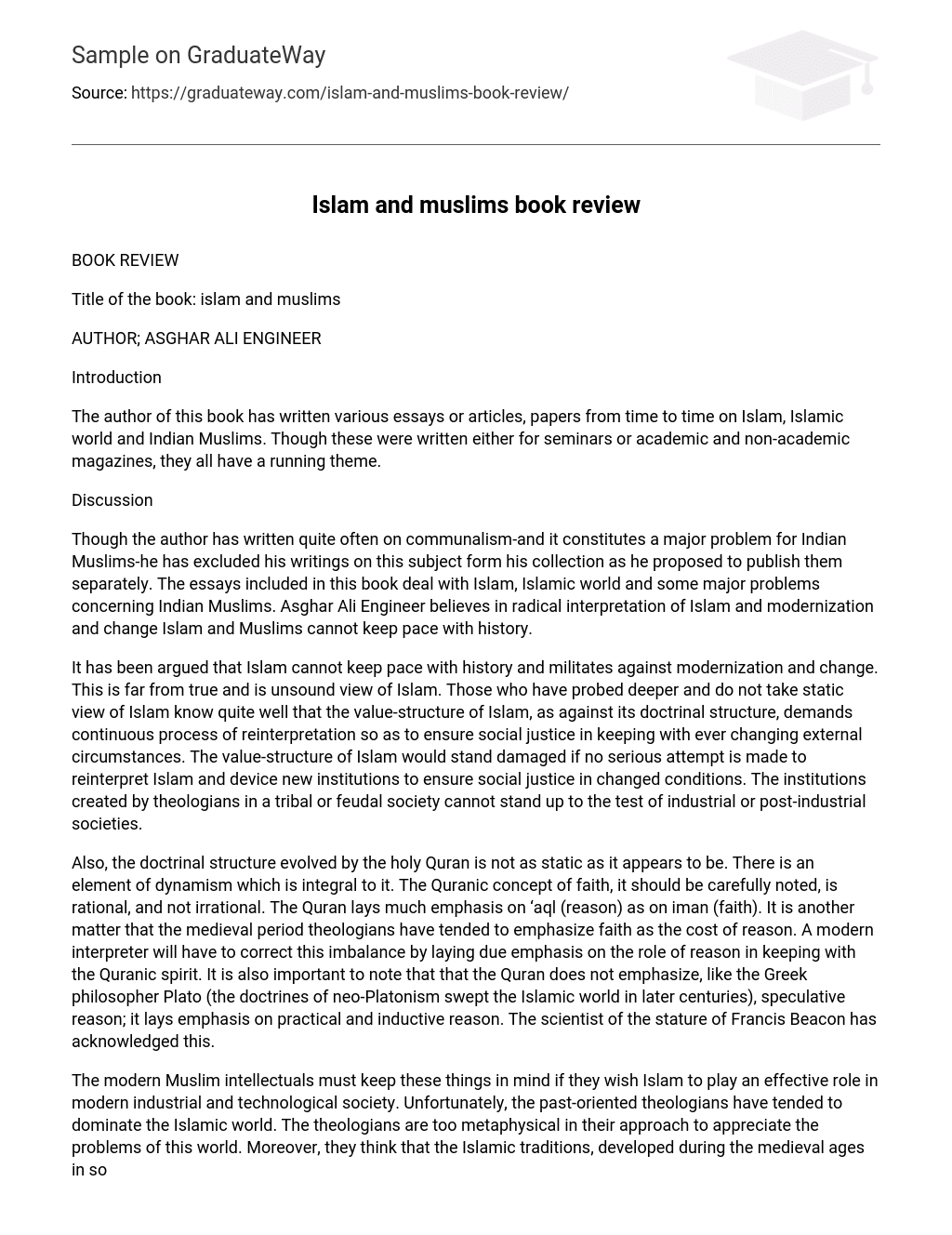BOOK REVIEW
Title of the book: islam and muslims
AUTHOR; ASGHAR ALI ENGINEER
Introduction
The author of this book has written various essays or articles, papers from time to time on Islam, Islamic world and Indian Muslims. Though these were written either for seminars or academic and non-academic magazines, they all have a running theme.
Discussion
Though the author has written quite often on communalism-and it constitutes a major problem for Indian Muslims-he has excluded his writings on this subject form his collection as he proposed to publish them separately. The essays included in this book deal with Islam, Islamic world and some major problems concerning Indian Muslims. Asghar Ali Engineer believes in radical interpretation of Islam and modernization and change Islam and Muslims cannot keep pace with history.
It has been argued that Islam cannot keep pace with history and militates against modernization and change. This is far from true and is unsound view of Islam. Those who have probed deeper and do not take static view of Islam know quite well that the value-structure of Islam, as against its doctrinal structure, demands continuous process of reinterpretation so as to ensure social justice in keeping with ever changing external circumstances. The value-structure of Islam would stand damaged if no serious attempt is made to reinterpret Islam and device new institutions to ensure social justice in changed conditions. The institutions created by theologians in a tribal or feudal society cannot stand up to the test of industrial or post-industrial societies.
Also, the doctrinal structure evolved by the holy Quran is not as static as it appears to be. There is an element of dynamism which is integral to it. The Quranic concept of faith, it should be carefully noted, is rational, and not irrational. The Quran lays much emphasis on ‘aql (reason) as on iman (faith). It is another matter that the medieval period theologians have tended to emphasize faith as the cost of reason. A modern interpreter will have to correct this imbalance by laying due emphasis on the role of reason in keeping with the Quranic spirit. It is also important to note that that the Quran does not emphasize, like the Greek philosopher Plato (the doctrines of neo-Platonism swept the Islamic world in later centuries), speculative reason; it lays emphasis on practical and inductive reason. The scientist of the stature of Francis Beacon has acknowledged this.
The modern Muslim intellectuals must keep these things in mind if they wish Islam to play an effective role in modern industrial and technological society. Unfortunately, the past-oriented theologians have tended to dominate the Islamic world. The theologians are too metaphysical in their approach to appreciate the problems of this world. Moreover, they think that the Islamic traditions, developed during the medieval ages in societies which were not wholly Islamic in the Quranic sense can be transplanted lock. Stock and barrel to the modern industrial societies. Such an attempt at unnatural transplantation is giving rise to various complex problems.
The author have tried in various articles included in this book to reinterpret Islam in a way which would ensure the true spirit of its value-structure on one hand and , refashion its parts of its doctrinal-structure in a way so as to ensure proper role of reason, on the other. The author considers his formulations as tentative. One can certainly come out with better and sounder formulations. He considers himself fortunate if his tentative formulations provide some food for further thought on the subject. The author has tried to draw the attention of his readers, particularly, to the problem of the reformist Bohras. This community is passing through a period of great turmoil due to a prolonged fight for reform and change. The grip of priesthood on the community is too strong to be got rid of easily. The fight has brought tremendous suffering of thousand of Bohras families.
The problems being faced by Bohras have been analyzed in the two articles of this book. These articles show how religion is being grossly misused by the Bohra clergy for its own well-entrenched interests. This struggle for reforms clearly shows that a powerful religion establishment can frustrate for long any attempt at reform and change. It is also interesting to note this connection that the Bohra priesthood has fully exploited the parliamentary democracy for its own ends. The ruling politicians, for fear of loosing votes have either colluded with the priesthood or remained passive speculators expressing their helplessness. The case of change in Muslim Personal law is no different.
Conclusion
Last but not least, the author of this book has expressed his fervent desire that the new generation of Muslims should not be content with mere rethinking defenses of medieval Islam. It should rather boldly face the new problems thrown up by the modern society and rethink the doctrinal structure of Islam so as to make its value-structure more meaningful in a concrete sense.
References
Asghar Ali Engineer, (1985), Islam and Muslim: A Critical Reassessment, Printwell Publisher: Jaipur.





